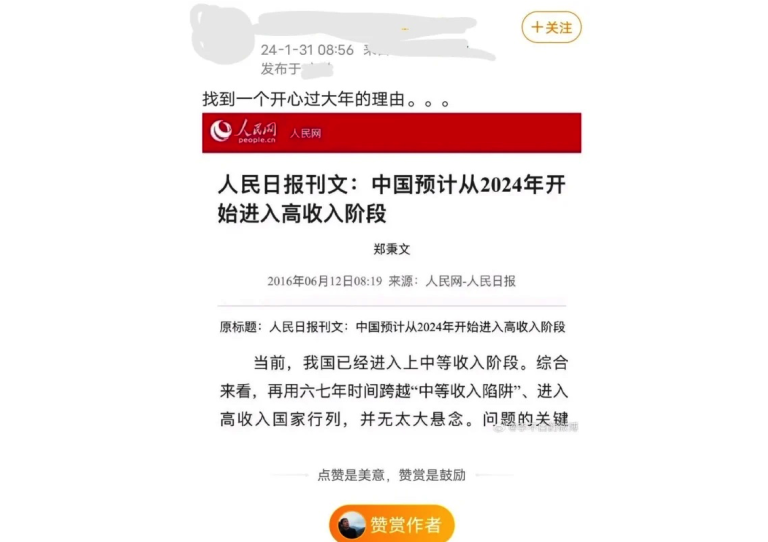By Li Xiaokui, Vision Times Staff
The Chinese economy is facing severe setbacks, and the post-90s and post-2000s generations living on the mainland are choosing not to marry, have children, or buy houses due to challenges like job scarcity, low salaries, and a significant increase in living expenses.
Especially since the three years of “zero-COVID” lockdown measures imposed following the outbreak of the SARS-CoV-2 pandemic, China has not experienced the expected recovery, instead seeing business and finances continue to wither.
Recently, Chinese netizens discovered a nearly decade-old article published by the Communist Party-run People’s Daily painting a rosy picture of the future, claiming that China would become a “high-income” country by 2024.
On Jan. 31, a Weibo user shared the article, published in June 2016, titled “Starting in 2024, China Expected to Enter the High-Income Stage” (中国预计从2024年开始进入高收入阶段).
Success
You are now signed up for our newsletter
Success
Check your email to complete sign up
The piece was widely shared on mainland Chinese social media, inviting scorn and sarcasm.
Progression to high-income guaranteed ‘as long as there are no politically disruptive errors’
A look at the article itself shows the author’s thought process, including the caveats he described.
People’s Daily quickly deleted the article, which had been penned by Zheng Bingwen, a researcher at the Research Center for the Theoretical System of Socialism with Chinese Characteristics at the Chinese Academy of Social Sciences.
Zheng began by stating that “at present, our country has already entered the upper-middle-income stage,” avoided the “middle-income trap.” Based on this assertion, Zheng posited that China would assuredly join the ranks of the high-income countries no later than six or seven years following 2016.
He divided the stages of China’s economic development into four stages: 1978 to 1998 was when China was low-income; between 1999 and 2009, the country was in the lower-middle income stage; and has progressed to upper-middle income as of 2010. By 2024 — eight years in the future at the time of Zheng’s writing — China would be in the high-income stage.
However, Zheng warned that “high-income countries do not necessarily become developed economies, as becoming a developed economy requires meeting a comprehensive evaluation system.”
“As long as there are no politically disruptive errors, no economically destructive blows, and no systemic disruptions, in another six or seven years, our country will successfully overcome the ‘middle-income trap’ without any suspense,” he continued.
Despite his “high-income” premise, Zheng noted that as a comparison, China would take until 2035 to catch up to South Korea’s GDP per capita annual income as of 2015, which was US$27,000 that year.
He emphasized the importance of China remaining friendly to international trade and business, while improving its “soft power” if it were to escape the middle-income trap.
Middle-income trap
The “middle-income trap” describes a situation where to due to corruption, poor governance, and other political or societal factors, a country is not able to move beyond a certain point in its economic development, and perpetually lags behind the most affluent countries.
Under its oppressive and inefficient communist regime, the Chinese economy exhibits signs of being stuck in the middle income trap, rather than crossing past it the way Zheng had hoped.
Despite the original article being removed from the Peoples’ Daily site, discussions about the piece continued among mainland Chinese internet users.
One sarcastic comment reads: “Look at this pie in the sky, it’s getting bigger and bigger.” Another flat-out said, “Real estate and stocks have collapsed.”
Another made fun of China’s widely doubted official economic data: “No matter how difficult your life is, the Statistics Bureau will help you raise your income.”
“Good days are indeed ahead,” and “If you can’t meet the standard, just lower the standard. Consider everyone with an income above 1000 yuan a month [around US$140] as high-income,” other users wrote.
On Jan. 17, the Chinese National Bureau of Statistics (NBS) released the income and consumption expenditure data for Chinese residents in 2023. The data indicates that the average per capita disposable income of Chinese residents in 2023 was 39,218 yuan (around US$5,400), averaging 3,268 yuan per month, or around US$454.
Median per capita disposable income for residents across the country was 33,036 yuan, averaging 2,753 per month.
In terms of consumption, the average resident of mainland China spent 26,736 yuan in 2023, showing a nominal growth of 9 percent.
In 2020, the late Chinese Premier Li Keqiang had admitted that China had around 600 million people of middle- to low-income, with an “average monthly income of around 1,000 yuan.”















